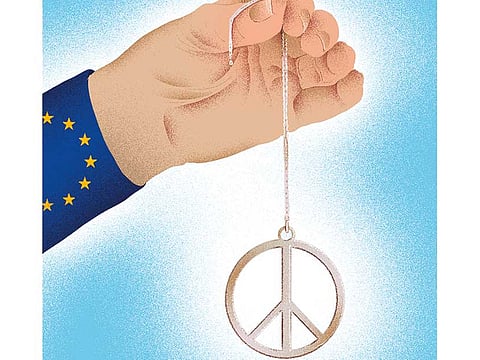Europe can do much more for peace in the Middle East
The EU can show its clout, political dexterity and negotiating skills by turning things around in the region

Mean-spirited and politically-callous is the best way to describe the new policy of the administration of United States President Donald Trump that recognised occupied Jerusalem as the capital of Israel. It is incumbent upon the Palestinian leadership to act quickly before the decision to move the US embassy from Tel Aviv to occupied Jerusalem is executed by end-2019. The visit of Palestinian President Mahmoud Abbas to the headquarters of the European Union (EU) in Brussels last month was a good start, but the pressure must be kept on, now and over the next two years.
Despite the potential horrors of the American decision that comes at a time when the Middle peace process is at its nadir, the rights of the Palestinian people are supported by the international community. And nowhere has this been more evident than in Europe and the EU, a powerful political, social and economic bloc of countries that believes in a two-state solution with occupied Jerusalem — a holy city for Muslims, Christians and Jews, to be shared by a newly-independent Palestinian state, alongside an Israeli one.
If the right wing in Israel and its new cohorts in White House think they can change things around, they will be in for a surprise. The EU has long believed in a negotiated solution on the June 1967 borders and that can’t be changed. It is the bare minimum the Palestinians have come to expect and is supported by many voices in the world. Europe is in a very strong position to make good on its words. It needs to be persuaded, cajoled and asked to “corner” Israel to accept a two-state solution, something it continues to defer.
So far, it has sought to stay on the fence, satisfied with its role as an economic backer of the Palestinians and leaving the political side of the negotiations to the Americans, acting as sponsors to push the Middle East talks along. But nothing has been gained. The EU has made its voice heard, consistently and persistently, offering developmental aid, money to develop institutions, and project initiations on the Occupied Territories, but have left the big political questions for the Americans who actually have done little to try and persuade the Israelis to take a more constructive approach to move the Middle East peace talks forward.
But insofar as they have played a “service” role, regardless of however much they have come to call for “pragmatic” solutions and optimal options for a land of two people — Arabs and Jews — America has left the court without an umpire or referee and shirked its responsibilities. This is surely not good politics for a regional, global bloc. Now is the time to bring the power to bear. It is up to the Palestinian leadership, the Arabs and the Muslim world now to point to the Europeans that they can do much more than the “service” role they have comfortably put themselves into for at least the past 10 or 15 years and get off the fence to become effective players who understand the international politics of the area.
At present, their dismay at the Trump administration is couched in diplomatic language and “euphemisms” with EU Foreign Policy Chief Federica Mogherini insisting on a belief in a multilateral peace framework, something that Israeli Prime Minister Benjamin Netanyahu is totally opposed to and calling for a lone American anvil. The EU has to insist on playing a more forthright, direct approach to the “novice” American administration, which at the very least can be accused of naivety to the intractability of the Middle East situation and at the most, contemptuous, bloating, disdainful and one-sided towards Israel.
Entangled sides
It is up to Europe to show its strength as a bloc and its political dexterity as a people with negotiating skills that could help turn things around. It recognises the complexity of the situation of the Middle East peace process, its intricateness and entangled sides. This is why it has to take it upon itself to explain the basics anew to an American administration that has “suddenly” come forward with preconceived ideas about the world and how it should look like, without any bearing on the local, regional and international realities.
The clock is ticking. The Trump administration could be in power for three more years and may even get re-elected for another four years, but the damage its new policies could have on the region would certainly be far-reaching and take decades to undo. We are already in a precarious situation, with Israel spreading its legitimacy and control over the Occupied Territories.
Marwan Asmar is a commentator based in Amman. He has long worked in journalism and has a PhD in Political Science from Leeds University in the UK



